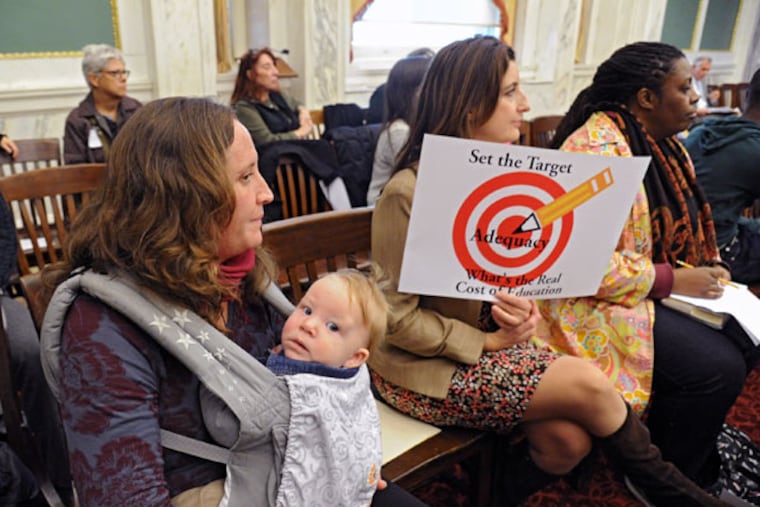Pa. lawmakers take heat over school funding
Members of the Pennsylvania Basic Education Funding Commission got an earful Tuesday at City Hall. State legislators charged with developing a new formula to distribute state funds for public schools heard from parents, school principals, education advocates, experts, and city and school district officials.

Members of the Pennsylvania Basic Education Funding Commission got an earful Tuesday at City Hall.
State legislators charged with developing a new formula to distribute state funds for public schools heard from parents, school principals, education advocates, experts, and city and school district officials.
While the details of their testimony varied, all said the state needed to provide more funding for schools and to develop a fair method for disbursing the money that provides additional resources for students who are poor, learning English, or require special-education services.
"Our schools need a differentiated formula that acknowledges the difficulties of educating students who come from deep pockets of poverty, as well as those who are new to this country and speak little or no English," said Bill Green, chairman of the Philadelphia School Reform Commission.
Such a formula, he said, "will help not just Philadelphia children, but students in many rural districts as well as Reading, Allegheny [County], Lancaster, and more."
Pennsylvania is one of three states that lack such a funding formula.
Mayor Nutter warned, "Simply funding the status quo is standing still while the rest of the world is racing forward."
After reductions in state basic-education funds over the last few years, districts and parents across the state pressed the legislature to come up with a funding plan for public schools, including charters.
Gov. Corbett signed legislation in June that created the commission. The panel has been holding hearings across the state and will make recommendations to the legislature.
On Tuesday, Temple University president Neil D. Theobald told the panel that he was testifying because his academic specialty was school finance. Before he became a university administrator, he was involved in developing funding formulas for Iowa, Indiana, Michigan, Ohio, and Washington.
All those states wound up with a system that met their individual needs, he said. Theobald urged the panel to tailor its approach to the needs of Pennsylvania schools and recommended keeping the formula simple so it could be easily understood and trusted.
In nearly five hours of testimony, commission members also heard plenty about the ways that cuts in state funding and the elimination of the charter-reimbursement program have crippled Philadelphia schools.
"We have taken severe steps to address our fiscal crisis," Superintendent William R. Hite Jr. said. "These cuts have allowed the School District's budget to be balanced the past few years, in line with our commitment to spend only available revenues. But at what cost?"